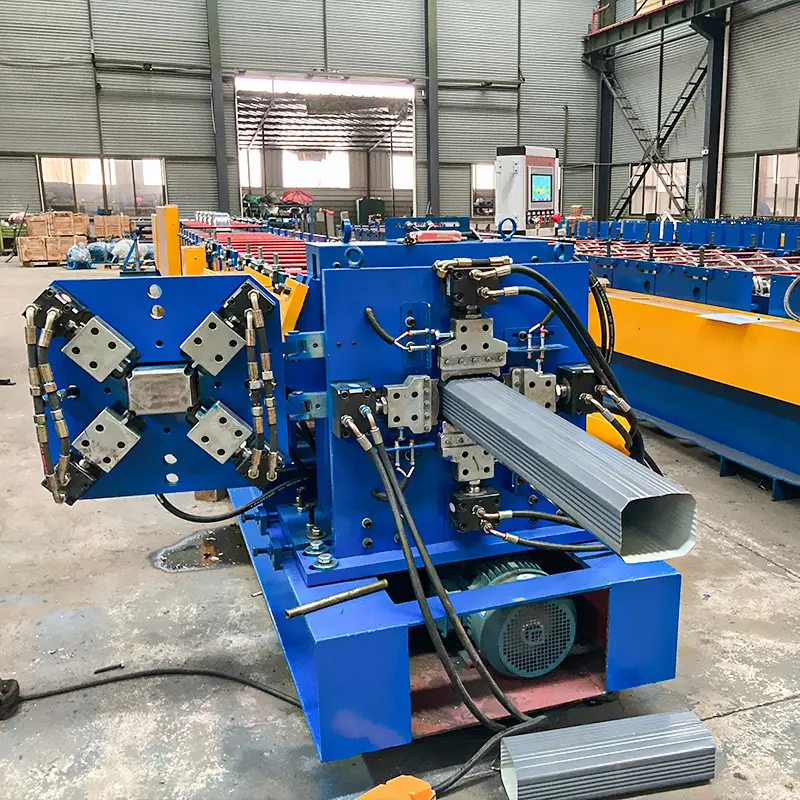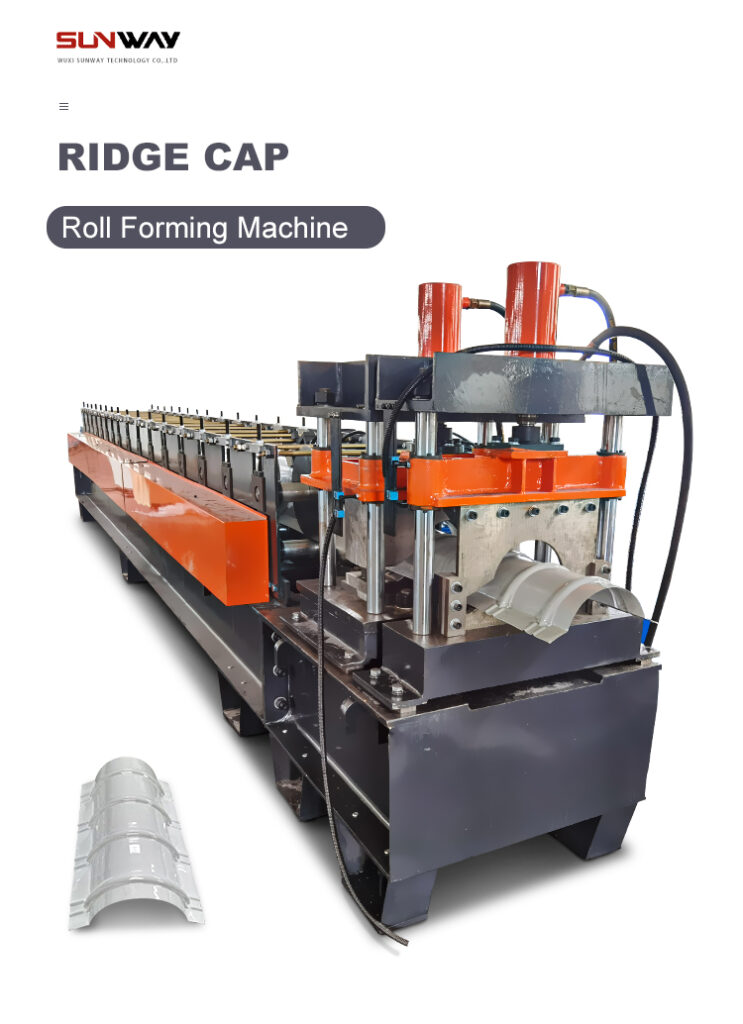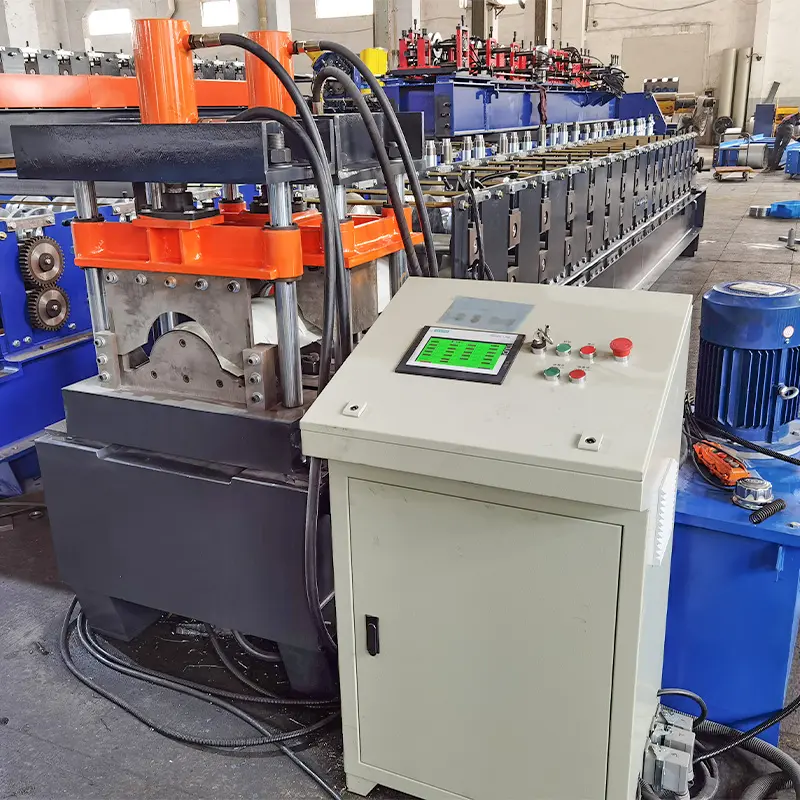Introduction
In the ever-evolving world of manufacturing, automation continues to play a pivotal role in enhancing efficiency, productivity, and accuracy. One such innovation that has transformed the metalworking industry is the fully automatic roll forming machine. This article delves into the concept of a fully automatic roll forming machine, its working principles, applications, benefits, and key factors to consider when choosing the right machine for your business.
What is a Fully Automatic Roll Forming Machine?
A fully automatic roll forming machine is a cutting-edge piece of equipment used to create metal profiles with high precision and speed. It takes coiled metal sheets or strips and passes them through a series of roller stations to gradually form the desired profile. Unlike manual or semi-automatic machines, this automated solution requires minimal human intervention during the production process.
How Does a Fully Automatic Roll Forming Machine Work?
The operation of a fully automatic roll forming machine involves a sequence of precise steps. Initially, a decoiler feeds the metal coil into the machine, followed by a leveling process to ensure flatness. The metal then passes through sets of rollers, each designed to shape specific portions of the profile. An integrated cutting system ensures accurate cutting of the formed profiles to the required length.

Advantages of Using a Fully Automatic Roll Forming Machine
Increased Production Efficiency
The automation of the roll forming process significantly enhances production efficiency. The machine’s continuous operation and rapid forming capabilities allow for higher output rates compared to traditional methods.
Consistent and Accurate Output
Fully automatic roll forming machines deliver unmatched precision and consistency in the profiles produced. This eliminates variations and ensures the final products meet strict quality standards.
Cost Savings in Labor
With reduced reliance on manual labor, businesses can save significantly on labor costs while increasing overall productivity.
Applications of Fully Automatic Roll Forming Machines
The versatility of fully automatic roll forming machines makes them indispensable across various industries. Some of the primary applications include:
Automotive Industry
In the automotive sector, these machines are used to fabricate structural components, roof rails, and other customized profiles required for vehicle assembly.
Construction Industry
Fully automatic roll forming machines play a crucial role in producing metal profiles used in constructing walls, roofs, and other structural elements.
HVAC Industry
For heating, ventilation, and air conditioning systems, these machines create air ducts and other specialized profiles with precise dimensions.
Electrical Industry
In the electrical sector, fully automatic roll forming machines are employed to manufacture cable trays, conduit pipes, and other electrical enclosures.
Types of Profiles Formed by Fully Automatic Roll Forming Machines
Fully automatic roll forming machines can create various profiles to suit specific requirements. Some common types of profiles include:
C-Channel Profiles
These profiles have a shape resembling the letter “C” and find applications in various structural and manufacturing projects.
Z-Channel Profiles
Z-channel profiles have a unique “Z” shape and are ideal for use as supporting elements and framing structures.
U-Channel Profiles
U-channel profiles are characterized by their U-shaped design and are commonly used as edging and trim components.
Custom Profiles
Apart from standard profiles, fully automatic roll forming machines can be programmed to produce custom-designed profiles as per specific customer needs.

Features to Consider When Choosing a Fully Automatic Roll Forming Machine
Selecting the right machine for your business requires careful consideration of the following features:
Material Thickness and Width Capacity
Ensure the machine can handle the material thickness and width required for your intended profiles.
Number of Stations
More roller stations allow for greater profile complexity and can accommodate a broader range of products.
Speed and Production Rate
Consider the production speed of the machine and evaluate whether it aligns with your production requirements.
Control Systems
Modern machines come with advanced control systems, offering user-friendly interfaces and efficient programming capabilities.
Post-Cut or Pre-Cut System
Choose between post-cut and pre-cut systems based on your preferences and production needs.
Maintenance and Care of Fully Automatic Roll Forming Machines
Regular maintenance is essential to ensure the longevity and optimal performance of your fully automatic roll forming machine. This includes routine inspections, lubrication, and addressing any issues promptly.
Troubleshooting Common Issues with Fully Automatic Roll Forming Machines
Understanding and troubleshooting common problems can minimize downtime and keep your production running smoothly. Some common issues include:
Material Jamming
Detect and resolve material jamming to avoid damage to the machine and ensure continuous production.atGPT
Inconsistent Profile Dimensions
Identifying and rectifying inconsistencies in profile dimensions is crucial to maintaining the quality of the end product. Check for misalignments, worn-out rollers, or any other issues that may affect the precision of the forming process. Regular calibration and adjustments can help mitigate this problem.
Excessive Noise and Vibration
Excessive noise and vibration may indicate mechanical issues or misalignment within the machine. Conduct thorough inspections to identify the source of the problem and perform necessary repairs or replacements.
Safety Precautions When Operating a Fully Automatic Roll Forming Machine
Operating a fully automatic roll forming machine requires strict adherence to safety protocols. Ensure the safety of operators and workers by implementing the following precautions:
Training and Proper Instruction
Provide comprehensive training to operators and personnel involved in operating the machine. Proper understanding of the equipment and safety procedures reduces the risk of accidents.
Personal Protective Equipment (PPE)
Enforce the use of appropriate personal protective equipment, such as safety goggles, gloves, and ear protection, to safeguard against potential hazards.
Machine Guards and Safety Interlocks
Install safety guards and interlock systems to prevent access to moving parts during operation, reducing the risk of injuries.
Regular Inspections and Maintenance
Regularly inspect and maintain the machine to ensure its safety and optimal performance. Address any issues promptly to avoid potential accidents.

How to Choose the Right Fully Automatic Roll Forming Machine for Your Business
Selecting the most suitable fully automatic roll forming machine is a critical decision for your business. Consider the following factors when making your choice:
- Production Requirements: Determine the volume of profiles you need to produce and choose a machine that can meet your production demands.
- Profile Complexity: If you require intricate and custom profiles, opt for a machine with a higher number of roller stations.
- Material Compatibility: Ensure that the machine is compatible with the materials you plan to work with, whether it’s steel, aluminum, or other metals.
- Automation Features: Look for advanced automation features, such as computer numerical control (CNC), to enhance precision and ease of operation.
- Manufacturer Reputation: Research the reputation and track record of the manufacturer to ensure you invest in a reliable and reputable machine.
Conclusion
The advent of fully automatic roll forming machines has revolutionized the metalworking industry, providing unmatched precision, speed, and efficiency in producing metal profiles. Their versatility makes them indispensable across numerous sectors, from automotive and construction to HVAC and electrical industries. When choosing the right machine, consider factors like production requirements, profile complexity, material compatibility, and manufacturer reputation. By adhering to safety protocols and conducting regular maintenance, businesses can maximize the benefits of fully automatic roll forming machines, streamlining production and delivering high-quality profiles.
FAQs
What is the difference between manual and automatic roll forming machines?
The main difference lies in the level of automation. Manual roll forming machines require significant human intervention during the forming process, while automatic machines operate with minimal human involvement, streamlining production and increasing efficiency.
Can fully automatic roll forming machines handle different materials?
Yes, fully automatic roll forming machines can handle various materials, including steel, aluminum, copper, and more, depending on the machine’s specifications and capabilities.
What factors can affect the production speed of a fully automatic roll forming machine?
Factors such as the complexity of the profile, material thickness, and the number of roller stations can influence the production speed of the machine.
Is operator training required for using a fully automatic roll forming machine?
Yes, operator training is essential to ensure safe and efficient machine operation. Proper training helps operators understand the machine’s functions, safety protocols, and troubleshooting techniques.
How do I know which type of profile I need for my specific application?
To determine the appropriate profile for your application, consult with roll forming experts or manufacturers who can assess your requirements and recommend the best solution.
Frequently Asked Questions (Supplemental)
1) What accuracy can a fully automatic roll forming machine achieve on cut length and profile geometry?
- With servo-driven flying shears and closed-loop encoders, ±0.25–0.5 mm cut-length tolerance and ±0.15–0.3 mm on critical flange/web dimensions are common on premium lines, assuming calibrated tooling and stable coil.
2) How do I minimize changeover time between different profiles or gauges?
- Specify quick-change cassettes, hydraulic die sets, automatic roll gap adjustment, and recipe-based tooling offsets in the HMI. For families of similar parts, shared-pass tooling reduces physical swaps to under 20–30 minutes.
3) What is the difference between pre-cut and post-cut in fully automatic lines?
- Pre-cut shears the strip before forming (useful for perforations/embossing alignment), while post-cut shears the formed profile (better end quality and speed). Many 2025 lines offer hybrid stations to support both.
4) Which data standards should my machine support for smart factory integration?
- Look for OPC UA/UMATI, MQTT, and REST APIs for MES/ERP connectivity, and ISO 23247/IEC 62264 alignment. Native support enables real-time OEE dashboards and predictive maintenance.
5) What coil quality parameters most affect profile consistency?
- Coil crown, camber (<3 mm per 10 m), hardness consistency, surface finish, and residual oil. A 6–9-roll precision leveler and automatic edge guides help normalize incoming variability.
2025 Industry Trends for Fully Automatic Roll Forming Machines
- AI vision and laser metrology: Inline cameras and triangulation lasers detect rib height, hole pitch, and edge burrs in real time, auto-correcting passes.
- Predictive maintenance by default: Vibration, thermography, and motor current analytics predict bearing, gearbox, and shear blade wear.
- Low-embodied-carbon steel/aluminum: EPD-backed coils and traceability via digital passports become common in construction supply chains.
- Wider, faster, quieter: Acoustic enclosures, servo gearboxes, and advanced hydraulics reduce noise and energy use while pushing speeds.
- Tooling-as-a-service: OEMs offer subscription plans covering roll regrinds, recoats, and spare kits with guaranteed uptime SLAs.
- Safety upgrades: Category 3 PL d safety circuits, light curtains with muting, and intelligent interlocks make high-speed lines safer.
2025 Benchmarks and Performance Indicators
| KPI | 2023 Typical | 2025 Leading Lines | Impact | Source/Notes |
|---|---|---|---|---|
| Line speed (m/min) | 20–40 | 40–80 (profile-dependent) | Throughput | OEM catalogs; trade fair demos |
| OEE (%) | 65–75 | 80–90 | Utilization & yield | MES-integrated plants |
| Scrap rate (%) | 3–5 | 1–2 | Material savings | AI vision + auto-adjust |
| Unplanned downtime (hrs/month) | 8–12 | 3–5 | Uptime | Predictive maintenance |
| Energy use (kWh/ton) | 120–160 | 90–120 | Operating cost | VFD/servo optimization |
| Length tolerance (mm) | ±0.8–1.0 | ±0.25–0.5 | Quality | Encoder + flying shear |
References:
- Metal Construction Association Tech Insights: https://www.metalconstruction.org
- OPC Foundation (OPC UA): https://opcfoundation.org
- UMATI (Machine Tool Connectivity): https://umati.org
- Global EPD Program (search steel/aluminum): https://www.environdec.com
- ISO Smart Manufacturing 23247 overview: https://www.iso.org
Latest Research Cases
Case Study 1: AI-Guided Roll Forming Line for Automotive Crash Rails (2025)
Background: Tier-1 supplier needed to cut scrap and stabilize geometry for 780–980 MPa AHSS rails at 50 m/min.
Solution: Installed servo-driven, fully automatic roll forming machine with inline laser profile scanners, thermal monitoring on gearboxes, OPC UA to MES, and automatic roll gap recipes per coil lot.
Results: Scrap reduced from 4.2% to 1.3%; cut-length CpK improved from 1.12 to 1.67; unplanned downtime dropped 46%; energy/ton lowered by 18%.
Case Study 2: Construction Purlin Line with Quick-Change Cassettes (2024)
Background: Fabricator producing C/Z purlins struggled with 2–3 hour changeovers and missed delivery windows.
Solution: Deployed fully automatic C/Z line with hydraulic tool change, auto-hole punching alignment, and post-cut flying shear; integrated MQTT data to ERP for live scheduling.
Results: Average changeover time fell to 24 minutes; weekly output up 28%; first-pass yield improved to 98.5%; payback achieved in 14 months.
Expert Opinions
- Dr. Ing. Markus Schneider, Head of Digital Manufacturing, Fraunhofer IPA
Viewpoint: “Closed-loop metrology tied to tooling offsets is the tipping point. It turns roll forming from an open-loop art into a predictable, self-correcting process.” - Sarah Kim, Senior Automation Engineer, Nidec Press & Forming Systems
Viewpoint: “In 2025, the winning lines combine servo motion, energy recovery drives, and smarter HMIs. The ROI comes from uptime and kWh saved, not just meters per minute.” - Javier Ortiz, Director of Operations, Apex Steel Fabrication
Viewpoint: “Standardizing on OPC UA and a common recipe library cut our changeover mistakes by 70% and made cross-training operators realistic.”
Practical Tools and Resources
- OPC UA & UMATI connectivity guides: https://opcfoundation.org | https://umati.org
- NIST Smart Manufacturing resources: https://www.nist.gov/programs-projects/smart-manufacturing
- ISO/IEC standards for integration (IEC 62264, ISO 23247): https://www.iso.org
- CRU and Worldsteel market/energy insights: https://worldsteel.org
- Maintenance management (open-source CMMS): https://www.maintainx.com or https://www.openmaint.org
- Vision inspection starter kits (machine vision): https://www.keyence.com and https://www.cognex.com
- Safety reference (ISO 13849, IEC 62061 overview): https://osha.europa.eu and https://www.iso.org
Implementation tip: For fully automatic roll forming machines, specify at RFQ stage the target OEE, length tolerance, maximum coil camber allowed, energy use (kWh/ton), and digital interface standards (OPC UA/MQTT). Require FAT with CpK and scrap rate acceptance criteria on at least two materials and three gauges.
Last updated: 2025-10-24
Changelog: Added 5 supplemental FAQs, 2025 trend analysis with KPI table, two recent case studies, expert viewpoints, and a curated tools/resources section focused on fully automatic roll forming machines and smart factory integration.
Next review date & triggers: 2026-05-01 or earlier if major standard updates (OPC UA/UMATI), new EPD/coating requirements, or significant OEM model releases affect benchmarks.
